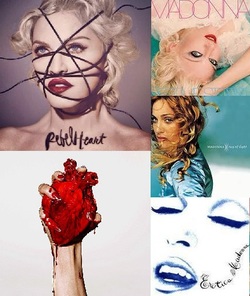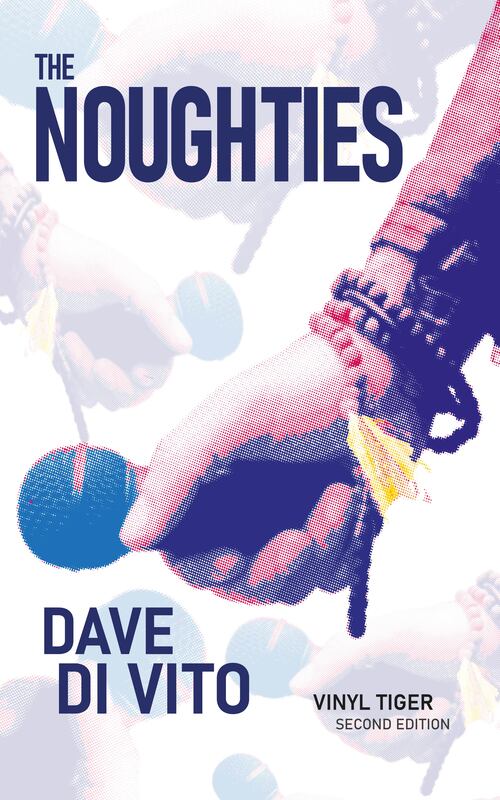 There’s a generational war going on, you know. It’s the twentieth century kids vs the Millennials: the generation so technologically savvy their arteries are powered by ADSL. A generation that perceives vinyl, cassettes and CDs as novel artefacts from another age. A generation that views the music industry as a sector that no longer sells albums and that it has reduced to an online singles market. You wouldn't know it, but music is being consumed now more than ever. It's just that no one is really buying it. (Amazing what clocks up 100million views on youtube these days though). If you were born before the nineties you’re probably still loathe to renounce your grip on what's going on around you. If it's any consolation, a lot of people see it as being a nineties rehash with some new bells and whistles thrown in. As always there is still great music being made by acts that manage to keep the ball moving. But there’s also a tussell going on between the two generations and the completely different metrics that are now used to describe success. Many note that the new generation has more information at its disposal than any other that came before it. But there's not a lot of context within which this information is placed, and the new set of rules mandated by our reliance on the internet makes any context mostly moot. At one point Madonna was pop's most proficient trend spotter (and the reigning queen of the 80s/90s and some of the 00s). Back then, particularly during the nineties, she often represented something of a Salem witch, and was repeatedly burnt at the stake for her brand of pop music and her rebellious antics in the face of a pretty conservative culture. The Nineties version of Madonna is back and fighting the fight again. If there's any doubt that we're not reliving the nineties again, consider that Madonna is once again a Salem witch. A lightning rod for the generational crisis who is repeatedly being burnt at the stake again. “Fell over at the Brits? Break a hip love?” "Drained Drake of all his eternal youth?" "Still making pop music?" #Sadandpathetic. It’s a sentiment that seems to be prevalent from a lot of 40 somethings (women and gays especially), who don't realise it yet, but are probably already in the #sadandpathetic category themselves, put there by the younger Millenials. Age shaming seems pretty moot by any standard, particularly if you're already in your 30s or 40s, especially when there's a whole new, younger generation that could probably take you out with a press of a button or a specifically designed app. Madge managed to outlast her contemporaries because we collectively couldn't imagine a world without her. The criticism of her musical credentials and her publicity tactics were usually extinguished by her phenomenal success. Her resilience and music has landed on the mark so consistently that it's hard not to view the times she fell out of favour as being similar to the kind of withdrawal of affection parents make to spur a child to do better next time. Her new album, Rebel Heart, all 19 tracks considered, hits the mark more often than it doesn't. Yes, like a lot of her recent projects there is an uneven nature to the album, that like a lot of her work has its share of clunkers. But the surrounding bedlam that has marked the album's hit and miss campaign has overshadowed the quality of her work, much as did during much of the nineties. In fairness, it's 2015 and we still can't imagine a world without her, even if the vitriol directed at her has been deafening of late. Her album has received very good reviews but, online we only seem interested in the fact that she fell over at the Brits, that Drake rebuked her, that she's made some questionable choices on Instagram or that she's tied up in the Tidal disaster. Positivity is a silent beast in the face of vitriol. But for all the hate she has engendered of late, there has been a lot of love directed her way recently. She's only now starting to be appreciated for everyone she paved the way for. She's now considered one of the best touring acts of all time, and has been celebrated for not resting on her laurels as a legacy act which she could so easily do. But, that all happens alongside the kind of public shaming that very few people are capable of withstanding. Rebel Heart, musically and thematically, is like a clash of trash talking Erotica Madonna (1992), the purring Bedtime Stories Madonna (1994) and the philosophical, experimental earth mother Madonna of Ray of Light (1998). Those albums arrived in a similarly Madonna-hostile environment, where she was consistently being burnt at the stake. But they arrived in a blaze of frenzy that she whipped up, and were released when she deemed them ready. They weren't exposed to the devastating leaks of unfinished demos that Rebel Heart has been. The RH demos were snapped up, commented on and even critiqued by major news outlets. The same outlets that then steered the vitriol of her being #sadandpathetic because she dared make comments about feeling violated by actions that effectively amounted to theft and personal invasion. Acts that basically robbed her right as an artist to choose when and how to release her own work. If, as some sectors of the press suggest, Madonna is so past her use by date, why the endless attention? How is it that she can still be click bait, generate such buzz with demos and still go on to sell half a million albums in a month in the face of her product already being largely out there? How is it, that she can still sell out shows for her upcoming tour if our 'need' for her no longer exists? It's a question that has existed since the early nineties, and possibly even back to the eighties. These were the decades in which Madge pressed every button in the sex/religion/taboo control room. But she was able to access that control room because her music, despite what many will have you believe, was amongst the best that was available in the mainstream. It's not the criticism of her current music that is at the heart of the seeming backlash she's on the receiving end of. Living For Love and Ghosttown, two of her finest singles, have received unanimous praise. Despite radio blacklists, everybody has heard them, seen the videos to them and, largely commended them, but they haven't been hits. The same thing happened with Gwen Stefani last year, but what was missing then was the glee with which the media has celebrated the relative commercial failure. Madonna's been around long enough to have withstood periods in which her songs didn't chart well or periods in which she was outsold by other acts. Today most of those acts no longer trouble the landscape, but there is talk that she too is on her way to joining them. Rebel Heart, as many in the media will tell you, has become her lowest selling album in her thirty year career. Undeniably true. But we are also in the middle of a time when albums just don't sell what they used to. Music is being consumed, but not purchased anymore. A hit mainstream album once had no trouble selling over ten million copies. Last year, the biggest selling album around the world sold 1.4 million copies. Added to the sales it generated in 2013, a total of 2.3 million copies were traceable worldwide. That my friends, is what a hit album is now capable of: very few out of the box releases do better, and when they do (see Ed Sheeran, Taylor Swift) they usually don't sell anywhere near what a hit album once did. Rebel Heart, just over two months after its official release has sold almost 600,000 copies. Nothing groundbreaking, and probably more than disappointing for what she and her management team are accustomed to, but more than anything, a sign of the times. With so many leaks, no subsequent chart hits and an online buzz that's not translating over to sales, Rebel Heart is like an early nineties Madonna album. Everyone knows its there, everyone knows that it isn't performing anywhere near as well as her other stuff did, but, its another addition to the cannon, and one that, will probably be better appreciated over time. In the meantime, expect more waves of publicity and a tour which, regardless of how it will land, will keep up the album's and her own profile for the year to come. As one of the few active icons of her generation, she still has a fight to fight.
0 Comments
Your comment will be posted after it is approved.
Leave a Reply. |
Dave
|
|
|
Dave Di Vito is a writer, teacher and former curator.He's also the author of the Vinyl Tiger series and Replace The Sky.
For information about upcoming writing projects subscribe to the mailing list. Dave hates SPAM so he won't trouble you with any of his own. He promises. |




 RSS Feed
RSS Feed